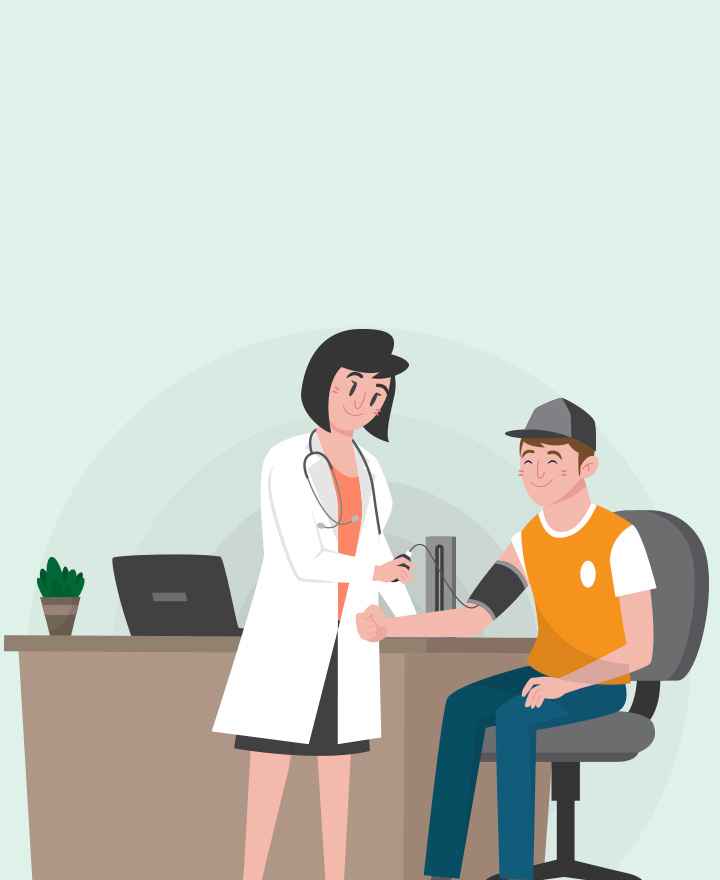

Hypothyroidism- Symptoms and causes
Underactive thyroid or hypothyroidism is a condition where the thyroid gland fails to produce enough thyroid hormones needed by the body. This condition is easily treatable with timely medication and regular doctor visits. Take a look at the article to know more.
Symptoms of Underactive Thyroid
The symptoms of an underactive thyroid (hypothyroidism) can vary in severity and can take time to develop, ranging between several months to even some years. Hypothyroidism symptoms often include:
1. Constipation
2. Pain or aches in various parts of the body
3. Muscle weakness
4. Weight gain
5. A numbing feeling in the hands
6. Higher sensitivity to cold temperatures
7. Fatigue
8. Problems with memory
9. Puffy face, drooping eyelids, and other physical changes
10. Higher than usual blood cholesterol levels
11. Feelings of depression
12. Frequent and heavier menstrual periods than usual
13. Dry skin
14. Low libido
15. Hair thinning
16. Slow heart rate (bradycardia)
17. Hoarse voice
18. Coarse skin and hair
People often mistake these hypothyroidism symptoms for ageing due to its slow developmental nature. The slow metabolism rate gives rise to more apparent signs over time.
Causes
Hypothyroidism, or underactive thyroid, can be caused by various factors and the specific cause of hypothyroidism can vary from person to person. This includes:
1. Autoimmune Thyroiditis
The most common cause of hypothyroidism is Hashimoto's thyroiditis, an autoimmune condition where the immune system attacks the thyroid gland.
2. Thyroid Surgery
Surgical removal of all or part of the thyroid gland can lead to hypothyroidism, especially if the entire gland is removed.
3. Radiation Therapy
Radiation treatment for conditions like head and neck cancers can damage the thyroid gland, leading to hypothyroidism.
4. Medications
Certain medications, such as lithium (used for bipolar disorder) and amiodarone (used for heart arrhythmias), can interfere with thyroid function.
5. Iodine Deficiency
In regions with low dietary iodine intake, the thyroid may not produce enough hormones, leading to hypothyroidism.
6. Congenital Hypothyroidism
Some infants are born with an underdeveloped or absent thyroid gland, leading to congenital hypothyroidism.
7. Pituitary Disorders
Rarely, hypothyroidism can result from a problem in the pituitary gland, which controls thyroid hormone production.
8. Aging
The risk of hypothyroidism tends to increase with age, especially in older women.
9. Other Autoimmune Diseases
Some individuals with other autoimmune conditions, like type 1 diabetes or celiac disease, may be at higher risk of developing hypothyroidism.
10. Infections
Certain infections, such as viral thyroiditis, can cause temporary thyroid dysfunction, which may resolve or lead to permanent hypothyroidism.
When to see a doctor
It is important to closely monitor your health and notice changes as hypothyroidism symptoms can take years to develop. If you are gaining unexplained weight, feeling constantly tired, experiencing constipation or facing any other signs of hypothyroidism, make sure to contact your health care provider immediately. The diagnosis is typically made through blood tests that measure thyroid hormone levels. Treatment usually involves thyroid hormone replacement therapy to restore hormone levels to normal.
Conclusion
With modern medicine and treatment options available, hypothyroidism symptoms can be managed. In some cases, underactive thyroid symptoms can fade over time. However, in the case of individuals with extremely low thyroid hormone levels, hypothyroidism needs to be managed throughout their life with medication and regular doctor check-ups.
One of the important components of our overall wellness is also being financially secured. Healthcare emergencies can happen any time, but a good health insurance policy can protect you from such uncertain situations. To know more about Wellness and other health related tips, visit the Wellness Corner
Source: my.clevelandclinic, mayoclinic, webmd
Disclaimer: This blog provides general information and discussions about health and related subjects. The information and other content provided in this blog, website or in any linked materials are not intended and should not be considered, or used as a substitute for, medical advice, diagnosis or treatment. Kindly contact your Doctor before starting a new medicine or health regime.
Related Articles
11 Home Remedies For Thyroid Problems
Common Thyroid Disorder - Causes, Diagnosis & Treatment
8 Foods to Avoid if You have Thyroid Issues
Yoga poses to improve Thyroid health
Thyroid – All about the Gland, Hormone, Test, Levels, and Insurance
Published on September 18, 2023


 Health Insurance
Health Insurance  Travel Insurance
Travel Insurance  Car Insurance
Car Insurance  Cyber Insurance
Cyber Insurance  Critical Illness Insurance
Critical Illness Insurance
 Pet Insurance
Pet Insurance
 Bike/Two Wheeler Insurance
Bike/Two Wheeler Insurance  Home Insurance
Home Insurance  Third Party Vehicle Ins.
Third Party Vehicle Ins.  Tractor Insurance
Tractor Insurance  Goods Carrying Vehicle Ins.
Goods Carrying Vehicle Ins.  Passenger Carrying Vehicle Ins.
Passenger Carrying Vehicle Ins.  Compulsory Personal Accident Insurance
Compulsory Personal Accident Insurance  Travel Insurance
Travel Insurance  Rural
Rural